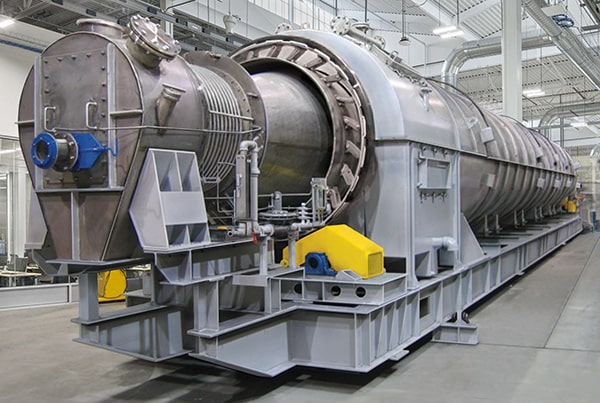
Posted on February 2nd, 2024 by hpprocess
Bulk solids processing in many industries relies on efficient heating. Process heating constitutes 70% of all process energy used in industries, as per the U.S. DOE.
In thermal processing of bulk solids, one piece of equipment reigns supreme: a rotary calciner, also known as a rotary kiln. These industrial workhorses play a vital role in several applications. They ensure efficient processing of a wide range of materials, including catalysts, hydrocarbons, activated carbon, lithium compounds, and precious metals.
In this blog, we explore rotary calciners’ critical contribution, shedding light on their operation, applications, and the numerous benefits they bring to industries worldwide.
How Rotary Kilns Process Bulk Solids
Rotary calciners, or rotary kilns, are ingeniously designed machines. They operate by slowly rotating a cylindrical furnace, which exposes the bulk solids inside to carefully controlled high-temperature conditions. This rotational motion ensures even heat distribution, eliminating hot spots and guaranteeing consistent product quality.
In the world of rotary kilns, there are two primary types:
- Direct-fired rotary kilns involve direct contact between the material and the heat source. They are best suited for materials that require high-temperature reactions.
- Indirect-fired rotary kilns use a separate heat exchanger to transfer heat to the material. This method is ideal for materials that must be processed in an enclosed space with a controlled atmosphere.
For most applications, indirect-fired rotary kilns are preferred due to their versatility and ability to handle a wide range of materials efficiently.
Where Rotary Kilns are Used
Rotary kilns are used in many industries, contributing to processing several materials we rely on daily. Some of the materials they handle efficiently are:
Spodumene and Li-Ion Compounds:
Rotary calciners handle various materials, including spodumene, lithium carbonate, LiFePO4, and LiMn2O4, crucial for Li-Ion battery production.
Lithium extraction from spodumene involves calcination to convert its crystal structure from alpha to beta form. Further, calcination is also required for acid roasting of spodumene to extract lithium as water-soluble lithium sulfate.
Carbon Products:
Rotary kilns are increasingly used to produce biochar and activated carbon from forest waste, supporting eco-friendly efforts.
Minerals:
Rotary calciners are crucial for calcination, roasting, and reduction of ores and minerals.
Catalysts: Rotary kilns are preferred for making catalyst substrates, impregnating carriers, and recycling spent catalysts.
Construction Materials:
Rotary kilns, often paired with industrial rotary dryers, are essential for drying bulk solids like cement, gypsum, and limestone before further processing.
Waste Materials:
They play a vital role in waste incineration, converting waste into useful energy and reducing its volume.
Benefits of Rotary Kilns
The use of rotary kilns offers a multitude of benefits, including:
- Customization: Rotary kilns allow extensive customization for optimal processing. Everything can be designed to meet the specific criteria of different applications, from diameter and length to internal components.
- High Capacity: Rotary kilns, especially indirect-heated calciners, excel in high-capacity processing. With volumes ranging from 200 lb/h to 20 tph, they are ideal for roofing granules manufacturing and mineral processing.
- Uniform Heat Distribution: Rotation ensures consistent temperatures throughout the material, preventing uneven reactions.
- Controlled Atmosphere: A controlled environment allows for reactions in specific atmospheres, critical in metallurgy and semiconductor manufacturing.
- Versatility: They can handle a wide range of materials, from minerals to chemicals, offering flexibility in production.
Optimize Your Bulk Solids Thermal Processing Today
Rotary calciners are efficient, heavy-duty machines that are indispensable for ensuring the efficiency of manufacturing processes.
Heyl Patterson offers high-quality rotary kilns and dryers engineered for your specific thermal processing needs. Whether lithium processing, materials drying, waste management, or metallurgy, you can rely on our rotary calciners.
Contact us today for a quote or learn more about how our products can fulfill your needs.










